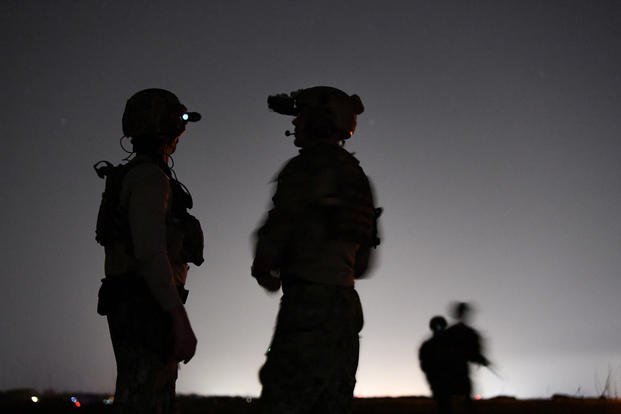A Naval Special Warfare platoon has been recalled from the war zone after their leader lost trust in their ability to carry out their mission -- an extraordinary move for a command that has faced recent troubling discipline problems.
The commander of the Special Operations Joint Task Force Operation Inherent Resolve in Iraq ordered a SEAL team platoon to return to San Diego "due to a perceived deterioration of good order and discipline within the team during non-operational periods," officials with U.S. Special Operations Command announced in a Wednesday night release.
"The Commander lost confidence in the team's ability to accomplish the mission," the release adds. "... All Department of Defense personnel are expected to uphold proven standards and to comply with laws and regulations. Alleged violations are thoroughly investigated."
While officials did not say in the statement which SEAL team the unit belonged to, the San Diego Union-Tribune reported it was the West Coast-based SEAL Team 7. The SEALs were sent home for drinking while deployed, the Washington Post reported.
Related content:
- The Navy SEALs Don't Have a Disciplinary Problem: Official
- Navy SEAL Gets Year in Brig for Hazing Death of Green Beret
- Corps Affirms Full Exoneration for MARSOC Unit Rocked by Scandal
The elite team was involved in the military's fight against the Islamic State group. Commanders in Iraq have worked to fill the void left by the SEAL platoon's sudden departure, officials said.
No additional details about the cause were immediately available. Officials with SOCOM and Navy Special Warfare Command could not be reached for comment.
The news comes a day after an explosive report from Navy Times about six special warfare operators from SEAL Team 10 popping positive for cocaine after command-led drug testing in April 2018. SEALs told investigators they considered the command's drug tests a "joke," Navy Times reported, saying they were easily able to skirt or beat them. The SEALs said they weren't often screened when they were deployed, and some said when they were tested, they'd use someone else's urine or even replace the sample with water from a urinal.
SEALs have also been involved in several high-profile legal cases.
Two SEALs were connected to the death of Army Staff Sgt. Logan Melgar, a 34-year-old Green Beret with whom they were deployed to Mali; Chief Special Warfare Operator Adam Matthews, a former member of SEAL Team 6, was sentenced to a year in prison after pleading guilty to several charges in connection to Melgar's death. Chief Special Warfare Operator Anthony DeDolph, another SEAL Team 6 member, is also facing charges.
During a briefing with senior leaders at the Pentagon Wednesday, the top enlisted member of Special Operations Command, Air Force Chief Master Sgt. Gregory Smith, was asked whether his community is "plagued with a culture of lawlessness."
Smith denied the problems being widespread.
"Do we have an issue? No. We have challenges, we have fraying," he said. "But are these things systemic? No. ... Is there room for improvement? Is any one ethical breach too much? Yes."
Thomas Modly, who's currently serving as the acting Navy secretary, said something similar about the SEAL community last year.
"We're a huge enterprise and so ... we have problems just like every other huge enterprise," he told reporters at an event in October. "So when these types of problems arise, we have very, very good processes to go through a legal adjudication of them, and I think we do that very well."
Though rare, this is not the first time special operations troops have been suddenly removed from the war zone. In 2007, members of Marine Corps Forces Special Operations Command's Fox Company were booted out of Afghanistan after they'd been wrongly accused of killing civilians.
While cleared of wrongdoing about a year later, they contended that leaders did little to set the record straight. After a lengthy battle for vindication, the Marines finally had their records wiped clean this year, the Washington Post reported.
-- Oriana Pawlyk contributed to this report.
-- Gina Harkins can be reached at gina.harkins@military.com. Follow her on Twitter @ginaaharkins.













